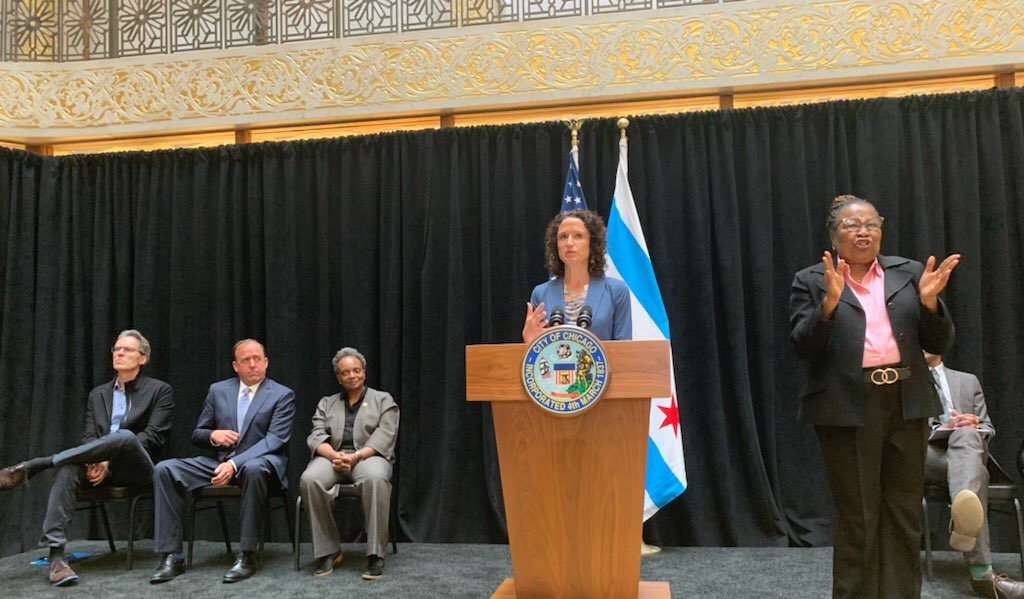The city of Chicago, Illinois is hoping that pervasive commercial vacancies along LaSalle Street in the Loop will soon disappear.
The corridor is being revitalized with new storefront businesses and more than 1000 new homes, including 300 affordable units, via an Invitation for Proposals (IFP) announced on September 26, 2022 by Mayor Lori E. Lightfoot. It’s part of the City’s LaSalle Reimagined initiative.
“This is a major step in helping revitalize an important corridor in Chicago’s Central Business District,” Ald. Brendan Reilly (42nd) said. “I look forward to reviewing the final proposals and working alongside Mayor Lightfoot to reinvigorate and redevelop the heart of Chicago’s economic engine.”
Owners of buildings located on or adjacent to LaSalle generally between Washington Street and Jackson Boulevard are eligible to respond to the IFP for potential City support.
Priority adaptive reuse proposals should involve underutilized properties that are either designated Chicago landmarks, eligible to be designated as landmarks, rated “orange” on the Chicago Historic Resources Survey, or contributing structures to the West Loop-LaSalle National Register District.
“There is nearly 5 million square feet of vacant commercial space on the LaSalle Street corridor, but not a single unit of affordable housing,” Mayor Lightfoot said. “Diversifying this corridor is an essential component in our strategy to restore LaSalle’s vitality, create more neighborhood-serving retail, and foster a more inviting pedestrian environment in the heart of the Loop that will benefit all Chicagoans.”
Issued by the Department of Planning and Development (DPD) and Department of Housing (DOH), the IFP is based on recent planning studies that identify mixed-use diversity and mixed-income housing as essential to the central Loop’s sustainability and resilience.
The studies address the corridor’s monoculture of aging commercial buildings, shifting market demands, and work-from-home trends that are contributing to the highest commercial and retail vacancy rates downtown, estimated at 26% and 35% respectively.
The studies include the “Central City Recovery Roadmap,” developed by the City with assistance from the Chicago Central Area Committee in June 2021, and an Urban Land Institute report for LaSalle issued in February 2022 with support from DPD, the Chicago Loop Alliance and other area entities.
“The IFP is a direct response to the need for a coordinated and comprehensive strategy that repositions the street as one of the most innovative, equitable and forward-thinking throughfares in the country,” DPD Commissioner Maurice Cox said. “As one of Chicago’s most architecturally compelling and transit-served corridors, there should be more mixed uses and far more economic activity both inside and outside of corridor properties.”
The IFP calls for proposals that revitalize underperforming buildings with equitable and sustainable improvements, including the conversion of commercial spaces to residential units of which 30% are affordable; the reactivation of building lobbies and other spaces for cultural or entertainment purposes; and storefront improvements that create more neighborhood-oriented amenities, such as grocery stores and restaurants that are locally owned and operated.
Public resources to help implement the initiative’s goals are expected to include federal tax credits, Cook County property tax incentives, Tax Increment Financing, PACE financing, Low Income Housing Tax Credits and other tools, subject to the review and approval of relevant public agencies and the Chicago City Council.
City support through the IFP will result in hundreds of new residents along the corridor, new cultural and entertainment destinations, and millions of dollars of additional annual tax revenues for the City.
To complement the effort, DPD and the Chicago Department of Transportation (CDOT) are studying complimentary improvements to provide a more dynamic and innovative public realm. CDOT will conduct an engineering assessment of existing conditions on LaSalle and a visioning process which will inform a forward-thinking design. DPD will simultaneously update the City’s “Central Area Plan,” created in 2003 and revised in 2009, and establish eligibility criteria for dining and cultural improvements that are supported by grants from the department’s Small Business Improvement Fund.
“For a reimagined LaSalle Street to reach its full potential, it needs infrastructure that is accessible, inviting, and innovative,” said CDOT Commissioner Gia Biagi. “Along with improving the structural conditions of the street, CDOT looks forward to building a Lasalle Street of the future that better serves its residents, workers, and visitors.”
The Department of Cultural Affairs and Special Events is exploring several more initiatives with the goal of reenergizing Chicago’s iconic LaSalle Street corridor by strengthening and activating the cultural sector.
These potential projects include:
- A vacant storefront pop-up public art program;
- A lighting design competition using our Chicago Public Art Prequalified List;
- Working with LUMA8 on a proposed Moon Festival, and with BOMA on a winter festival; and
- And working with the Chicago Architecture Center on a LaSalle-focused architecture engagement program.
“Revitalizing our city’s arts and culture scene is essential to our post-pandemic recovery,” said DCASE Commissioner Erin Harkey, “and the arts must be at the center of bringing Chicago back, in all 77 neighborhoods including Everyone’s Neighborhood, the Loop — and LaSalle Street, reimagined.”
“The LaSalle Reimagined initiative is a unique opportunity to create hundreds of homes, including much-needed affordable housing in the City’s central business district. This initiative moves us closer to our goal of an equitable distribution of affordable housing across all 50 wards and all 77 community areas, using our financial incentive tools in the way they are intended,” DOH Commissioner Marisa Novara said.
City assistance for future residential projects would require 30% of the units to be affordable. Currently, there are no zoning or other requirements for private adaptive re-use projects to include affordable housing.
Affordable units would be priced for tenants earning an average of 60% of the area median income (AMI), or $50,040 annually for a two-person household, based on 2022 AMI levels.
Proposals will be evaluated for City assistance based on economic viability, development team diversity and experience, design, public benefits, and other factors.
The IFP due date is December 23, 2022.
Photo courtesy of the Office of Mayor Lightfoot.
Learn more about the LaSalle Reimagined initiative and download the IFP.

